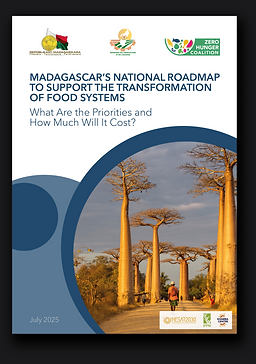
Country roadmaps
Food systems are under pressure
Climate shocks, food price inflation and surging malnutrition. Hunger is higher today than it was 10 years ago. Yet the global community can end hunger and poverty – nutritiously, equitably and sustainably – in the next decade.
Researchers from Hesat2030, together with the Zero Hunger Coalition and national governments, have developed a series of evidence-based, investment-ready roadmaps to tackle these challenges. The roadmaps present a costed portfolio of interventions tailored to national priorities with the aim of achieving five linked outcomes:
.png)
By acknowledging the complexity of systems, these roadmaps deliver multiple outcomes. They address trade-offs between limiting greenhouse gas emissions while improving nutrition and increasing productivity without further deforestation or biodiversity loss.
It is a unique exercise that integrates country priorities with evidence and economic modelling to achieve five outcomes simultaneously. The portfolios of interventions are based on evidence, acquired through an AI-powered literature review and economic modelling, from researchers in Hesat2030 combined with participatory, country-led interventions.

Achieving SDG 2 will require additional resources from countries and development partners
The additional public expenditure required to implement these roadmaps ranges from approximately US $1.9 billion in Zambia to US $4.5 billion in Madagascar. While the financial landscape is constrained, inaction will only drive up costs further. These roadmaps - and their additional costs - offer a clear path towards sustainable food systems and an end to hunger and malnutrition.
This can be achieved through better alignment between government and donor investments, between short-term funding cycles and long-term transformation goals, and across delivery systems offer an opportunity to secure resources.

Informing policy makers and donors on how to prioritise their investments for maximum impact
Through the Zero Hunger Coalition, Hesat2030 is working with partners to support food systems transformation in Bangladesh and Benin. Evidence-based findings have been delivered to these national governments.
Similar evidence-based and costed country roadmaps have been developed using the Ceres2030 methodology, the precursor to Hesat2030. These roadmaps focused on ending hunger, improving the livelihood of small scale farmers and ensuring that the identified interventions remained within the limits established in the Paris Agreement on climate.








